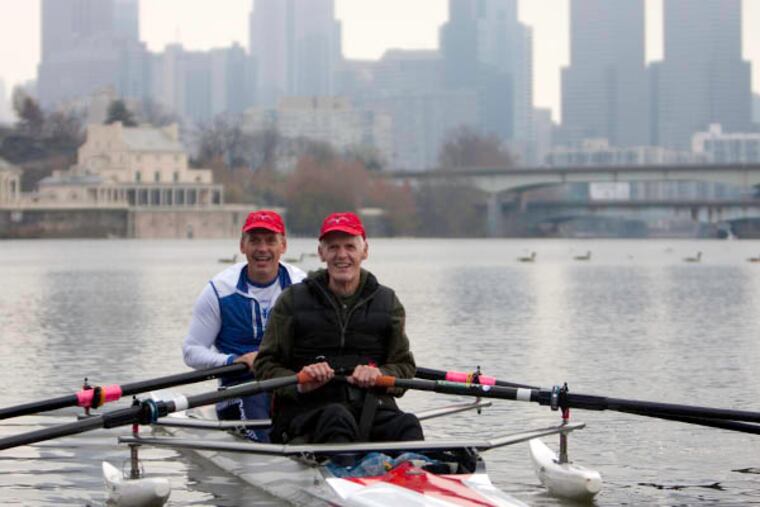Sculler paralyzed in fall is launched anew
For Fred Duling, always, the river beckoned. He grew up on the Schuylkill, arriving at Malta Boat Club in 1960 as a difficult boy of 16. On the river he found purpose. And strength. From there he launched a lifetime of rowing and coaching achievement that took him around the world.

For Fred Duling, always, the river beckoned.
He grew up on the Schuylkill, arriving at Malta Boat Club in 1960 as a difficult boy of 16. On the river he found purpose. And strength. From there he launched a lifetime of rowing and coaching achievement that took him around the world.
Yet Duling, now 68, had come to accept their permanent separation, the end of a 50-year relationship between him and the water. It disappeared in an instant on Dec. 6, 2010, when he tumbled over a banister at the Malta house on Boathouse Row, fracturing his spine in four places and leaving him paralyzed from the chest down.
But on Sunday, almost two years to the day since his accident, it came back - joyously, unexpectedly, tearfully, when Duling was presented with and helped into a specially adapted WinTech Racing double scull. With his son, Fred Jr., in the second seat, Duling pushed off from the dock and propelled himself through the blue water of the Schuylkill, the mist of the river upon his face.
How to describe it? How to explain how it felt to trade a wheelchair for the seat of a scull? Duling struggled for the words in an interview at his Fairmount home.
"Overwhelming," he said. "The flood of memories - while you can recall them, it's a totally different thing to relive them."
Fred Jr. had asked his father to come to Malta to coach that morning. When Duling arrived and saw the boat, he thought the club had bought a new double. Then he noticed the special rigging, and the big red-and-green letters that spelled Merry Christmas.
An hour later, Duling was back on the water.
"I wouldn't want to race him, and I mean that sincerely," said Malta president Mike Brown.
Three times, Duling represented the U.S. national team as a rower. As a coach, he led rowers to national championships. At Malta, he has served in nearly every capacity, currently as vice president and board member.
Beyond personal achievement, Duling has for decades been a beloved spirit of Boathouse Row, a mentor who cheerfully took on all tasks, from paperwork to weigh-ins. He was alone at the club, apparently hanging Christmas decorations, when he fell and landed on his head.
Duling could have died. Besides damaging his spinal cord, he broke his jaw, nose, and a cheek and eye socket, and suffered a concussion. He awoke in a pool of blood with Fred Jr. beside him, shouting, "Pop! Pop! Stay with us!"
Duling spent Christmas 2011 in intensive care at Thomas Jefferson University Hospital, undergoing three surgeries. He needed a respirator to breathe, his neck held in place by a metal halo screwed into his skull. He regained stamina at Magee Rehabilitation Hospital, only to be set back by additional surgeries in March.
He talked about rowing in the past tense.
In spring, Duling and his wife, Edith, were involved in a serious car accident that put him in the hospital for seven weeks. In summer, Duling was on Boathouse Row when he suffered heatstroke, and spent two more weeks hospitalized.
As he healed, he thought about the river. He had heard of adaptive sculls but knew that to move a single disabled person into a boat required the effort, time, and planning of at least three others.
Unbeknownst to him, as fall arrived, his wife and three children also were thinking about the river - and about his progress. By then, Duling had gone months without being hospitalized. Daily exercise had made him physically strong. Mentally and emotionally, he was better than at any point since the accident.
"We thought," said Sara Duling, his youngest daughter, "it was time to get him back on the river."
Everyone knows Philadelphia has a celebrated rowing history. But many don't know the city also was a birthplace of adaptive rowing. The sport began in the years after World War II, when blind veterans competed in an Army-Navy race here, according to Karen Lewis, coach of the national adaptive rowing team.
University of Pennsylvania coach Ted Nash was an early advocate. In 1980, Chris Blackwall, then director of USRowing, started the first club solely for people with disabilities, the Philadelphia Rowing Program for the Disabled, according to Lewis. The following year, the group, now called Philadelphia Adaptive Rowing, staged one of the first formal competitions in the country.
Today the annual Bayada Regatta is among the largest adaptive rowing events in the world, a platform for athletes reaching for the Paralympic Games.
On Sunday, Jeff McGinnis, director of the Pennsylvania Center for Adaptive Sports, was on the dock to help fit Duling's equipment.
"You can tell he's a rower - he went right out," McGinnis said. "Now he knows he can row again. Up until Sunday, he didn't know that."
Duling doesn't want people to think he's some sort of moral inspiration. Because there have been plenty of tough days.
He's gone from being an active, independent athlete to someone who needs help to dress himself.
But, Duling said, when you're on the water, pulling the oars, the worries of the world disappear in your wake.
It's given him an idea: To become a voice and advocate for adaptive rowing. To share his knowledge with disabled athletes who want to row.
"I missed rowing," Duling said, "but I didn't know how much I missed it. . . . Maybe I can help people find their way."